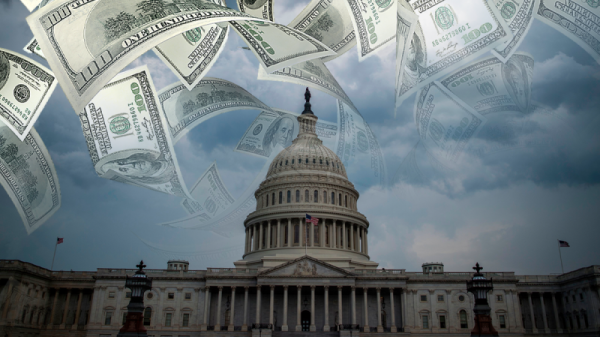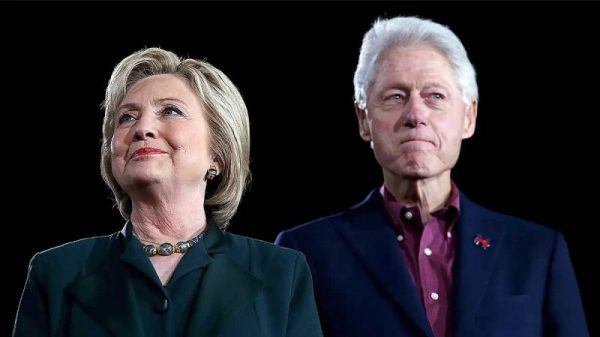Florida Gov. Ron DeSantis’s (R) bid for the 2024 Republican presidential nomination began with a focus on one specific word: “Fauci.”
“Don’t Fauci my Florida” gear went on sale as part of DeSantis’s bid for reelection to his current job in 2022. It was referring, as you probably know, to the then-chief infectious-disease doctor in the U.S. government, Anthony S. Fauci. Fauci made a convenient point of contrast for DeSantis as he played up his disregard for recommendations aimed at curtailing the spread of the coronavirus. This was partly about his reelection, but also obviously about drawing a contrast with Donald Trump before next year’s presidential primaries.
After a while, though, the potency of this wore off. The pandemic faded and so did the saliency of the issue. DeSantis shifted gears.
Following the lead of conservative media, the Florida governor began focusing on “critical race theory” and decrying everything “woke,” whatever that happened to mean on any given day.
He advocated legislation that passed through the Republican-led legislature in his state, including the “Stop WOKE Act,” which aimed at uprooting purported manifestations of “wokeism.” In practice, DeSantis’s push meant things such as revising how the state taught about the history of slavery and eliminating state programs aimed at bolstering diversity.
But this also lost potency. By the beginning of August, the New York Times was pointing to polling that showed even Republicans didn’t see battling “wokeness” as an important priority. DeSantis mentioned the word “woke” on his campaign social media account four times in June and twice in July — and not since.
This is one of the challenges of being reactive to the public mood, rather than shaping it. Donald Trump, too, launched his first presidential campaign by elevating arguments and rhetoric from right-wing media, but he also shaped what the media was talking about. DeSantis has largely followed the trends, and the trends shift.
During the GOP presidential primary debate on Wednesday, DeSantis didn’t use the word “woke” once. (He also didn’t say “Fauci.”) But he did use another pejorative term: “CCP,” referring to the Chinese Communist Party. At another point, he referred to his opposition to “communist China.” DeSantis has mentioned “CCP” or Chinese communism six times since the beginning of August — and numerous times before that.
He wasn’t alone in bringing it up during the debate. Vivek Ramaswamy, who is contesting DeSantis’s primacy in amplifying themes from right-wing media, similarly bashed China by way of its leadership: “The Communist Party of China is the real enemy.”
Criticizing China’s communism is by no means new in American politics, of course. But this phrasing, the “CCP” iteration of that criticism, seems to be in vogue at the moment. How did that happen?
As always, a useful way to answer such questions is to look at when it has been used on Fox News. Analysis of closed-captioning collected by the Internet Archive shows that use of “Chinese Communist Party” or “CCP” has been far more common on Fox News and Fox Business than on CNN and MSNBC. But there’s a clear point at which those references became more common: the start of the coronavirus pandemic in early 2020.
This is interesting, if not surprising. The pandemic spurred new attention to the reliability of the Chinese government as questions swirled about how and where the coronavirus first emerged. It was obvious that China was suppressing information about the virus and its effects on its population. There was reason to focus on China and on its leaders, members of the Communist Party.
Of course, President Donald Trump went further, seeking to blame China and those leaders for the spread of the pandemic in the United States largely as a means of exculpating himself. A database of Trump’s comments before and during his presidency shows that he began referring to the Chinese Communist Party only after the pandemic emerged.
The pejorative outlasted that concern about the pandemic. China remains a geopolitical threat to the United States, obviously, so this new appellation has applications that extend beyond how it handled the coronavirus.
There was another utility to it in both 2020 and after, of course: It once again pits America against communism. Republicans (and particularly Trump) have repeatedly characterized the American left as communistic — meaning, in this reinvigorated context, that they are anti-American.
The term became popular on the right. DeSantis, an experienced purveyor of right-wing jargon, picked it up. So Fauci and “wokeism” get a moment out of the spotlight.
Florida Gov. Ron DeSantis’s (R) bid for the 2024 Republican presidential nomination began with a focus on one specific word: “Fauci.”
“Don’t Fauci my Florida” gear went on sale as part of DeSantis’s bid for reelection to his current job in 2022. It was referring, as you probably know, to the then-chief infectious-disease doctor in the U.S. government, Anthony S. Fauci. Fauci made a convenient point of contrast for DeSantis as he played up his disregard for recommendations aimed at curtailing the spread of the coronavirus. This was partly about his reelection, but also obviously about drawing a contrast with Donald Trump before next year’s presidential primaries.
After a while, though, the potency of this wore off. The pandemic faded and so did the saliency of the issue. DeSantis shifted gears.
Following the lead of conservative media, the Florida governor began focusing on “critical race theory” and decrying everything “woke,” whatever that happened to mean on any given day.
He advocated legislation that passed through the Republican-led legislature in his state, including the “Stop WOKE Act,” which aimed at uprooting purported manifestations of “wokeism.” In practice, DeSantis’s push meant things such as revising how the state taught about the history of slavery and eliminating state programs aimed at bolstering diversity.
But this also lost potency. By the beginning of August, the New York Times was pointing to polling that showed even Republicans didn’t see battling “wokeness” as an important priority. DeSantis mentioned the word “woke” on his campaign social media account four times in June and twice in July — and not since.
This is one of the challenges of being reactive to the public mood, rather than shaping it. Donald Trump, too, launched his first presidential campaign by elevating arguments and rhetoric from right-wing media, but he also shaped what the media was talking about. DeSantis has largely followed the trends, and the trends shift.
During the GOP presidential primary debate on Wednesday, DeSantis didn’t use the word “woke” once. (He also didn’t say “Fauci.”) But he did use another pejorative term: “CCP,” referring to the Chinese Communist Party. At another point, he referred to his opposition to “communist China.” DeSantis has mentioned “CCP” or Chinese communism six times since the beginning of August — and numerous times before that.
He wasn’t alone in bringing it up during the debate. Vivek Ramaswamy, who is contesting DeSantis’s primacy in amplifying themes from right-wing media, similarly bashed China by way of its leadership: “The Communist Party of China is the real enemy.”
Criticizing China’s communism is by no means new in American politics, of course. But this phrasing, the “CCP” iteration of that criticism, seems to be in vogue at the moment. How did that happen?
As always, a useful way to answer such questions is to look at when it has been used on Fox News. Analysis of closed-captioning collected by the Internet Archive shows that use of “Chinese Communist Party” or “CCP” has been far more common on Fox News and Fox Business than on CNN and MSNBC. But there’s a clear point at which those references became more common: the start of the coronavirus pandemic in early 2020.
This is interesting, if not surprising. The pandemic spurred new attention to the reliability of the Chinese government as questions swirled about how and where the coronavirus first emerged. It was obvious that China was suppressing information about the virus and its effects on its population. There was reason to focus on China and on its leaders, members of the Communist Party.
Of course, President Donald Trump went further, seeking to blame China and those leaders for the spread of the pandemic in the United States largely as a means of exculpating himself. A database of Trump’s comments before and during his presidency shows that he began referring to the Chinese Communist Party only after the pandemic emerged.
The pejorative outlasted that concern about the pandemic. China remains a geopolitical threat to the United States, obviously, so this new appellation has applications that extend beyond how it handled the coronavirus.
There was another utility to it in both 2020 and after, of course: It once again pits America against communism. Republicans (and particularly Trump) have repeatedly characterized the American left as communistic — meaning, in this reinvigorated context, that they are anti-American.
The term became popular on the right. DeSantis, an experienced purveyor of right-wing jargon, picked it up. So Fauci and “wokeism” get a moment out of the spotlight.





















